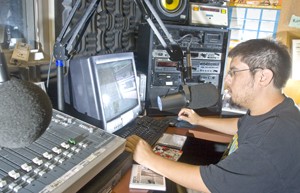KAMP Student Radio has begun the process of digitizing all of their archived music in an effort to free up space and to help them make a seamless transition to a primarily Internet-based radio station in the future.
The station has so many old CDs in its archives that it has to start clearing them out; otherwise it will have no place to put any new incoming music, said Zach Stephens, KAMP engineering director.
“”Our ultimate goal is to put our entire library on the computer, so it will be easier to catalogue, easier to go through and find music – keep everything centrally located,”” Stephens said. “”It will also make logging easier.””
While the process of uploading CDs onto a centralized hard drive has already begun, Stephens said that the end is nowhere in sight.
“”I’m doing about 150 CDs a week, maybe more,”” Stephens said. “”Considering we have got something like 10,000, maybe 15,000 CDs, (it may take) probably two years.””
Neema Eshrati, KAMP general manager, said that since the radio station is constantly receiving CDs from record companies, they have no choice but to find an alternative method for storing the music.
“”There are a few record labels that are slowly shifting towards digital music downloads and things like that, but primarily these record (labels) are still sending us physical CDs,”” Eshrati said. “”We will still be working with a lot (of CDs), but as far as our old library of things that have been through their rotation and are more just there for us to have fun with later on, that will be kept in digital format.””
Mike Camarillo, KAMP student adviser, said the station’s need to digitize its music does not currently seem to be an industry trend.
“”I don’t see CDs being phased out. This is a case that the student radio station has run out of storage space,”” Camarillo said. “”This is not something that CDs are going to go out of (style) or anything like that. I have not heard that. Will it eventually go in that direction? Quite possibly, but I am not sure.””
In addition to freeing up space, storing the music digitally will allow on-air DJs to have better access to the station’s entire library, Stephens said.
“”If someone requests a song, it may take us a few minutes, because we have to go look for it in the library, and CDs get out of order, get filed incorrectly. Sometimes they don’t get filed back into the archives at all, so it’s often hard to find CDs,”” Stephens said. “”On the computer, it is a lot easier to hold onto a song and maintain our library.””
Once the music is available in a digital format, it will simplify the station’s eventual transition to an Internet-based medium, Eshrati said.
“”Unless we hopefully obtain a really good FM signal some day, the easiest way for students on the campus to listen to us is through the Internet,”” Eshrati said. “”There is a chance that a lot more of the technology involved with radio stations will be geared towards digital archives and digital technologies and so on, but almost every station has a different outlook of what’s the best way to reach
their listeners.””
While the long-term goal of the station is to become entirely electronically based, Eshrati said one vintage aspect will remain intact.
“”The only thing I think that will be hard for us to digitalize is our vinyl collection, which is something we’re always going to have and always depend upon,”” Eshrati said. “”There is some old, old stuff that you can get, and that’s kind of one of the cool aspects of KAMP that we do have the great vinyl collection, and a lot of shows utilize that so that’s going to stay the way it is.””
While the process of shifting from CDs to digital copies will take an extended period of time, Eshrati said the main goal of the transformation is to increase the on-air product.
“”Our big thing is our radio personalities, and that is going to be the thing that bring uniqueness to all of the shows,”” Eshrati said. “”We will have all of the music digitalized, but it’s making it easier for the true stars of the radio station, which are the DJs.””









